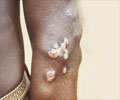Researchers in the US have used a new way to predict outbreaks of cholera - a water-borne infectious disease.
A new way to predict outbreaks of cholera - a water-borne infectious disease has been revealed by US researchers.
According to the researchers, this new technique could potentially control outbreaks of other important infectious diseases.The bacterium that causes cholera, Vibrio cholerae, has a known association with a crustacean (called a copepod), which lives on zooplankton, a type of plankton.
Cholera outbreaks have been associated with environmental factors, including sea surface temperature, ocean height, and biomass.
Professor Rita R. Colwell and her team at the University of Maryland, College Park, have used remote satellite imaging to track this climatologically important information and the data collected now can be used to predict outbreaks of cholera before they occur.
Cholera epidemics have been episodic, so the ability to predict them could be one further step towards controlling this serious, water-borne disease by providing rapid response public health measures.
The climate factors shown to be associated with cholera also play a role in many other infectious diseases.
Advertisement
"We are now beginning to understand infectious disease is a moving target. As the climate shifts, any disease with an environmental stage or vector is going to be affected," said Colwell.
Advertisement
RAS/M















